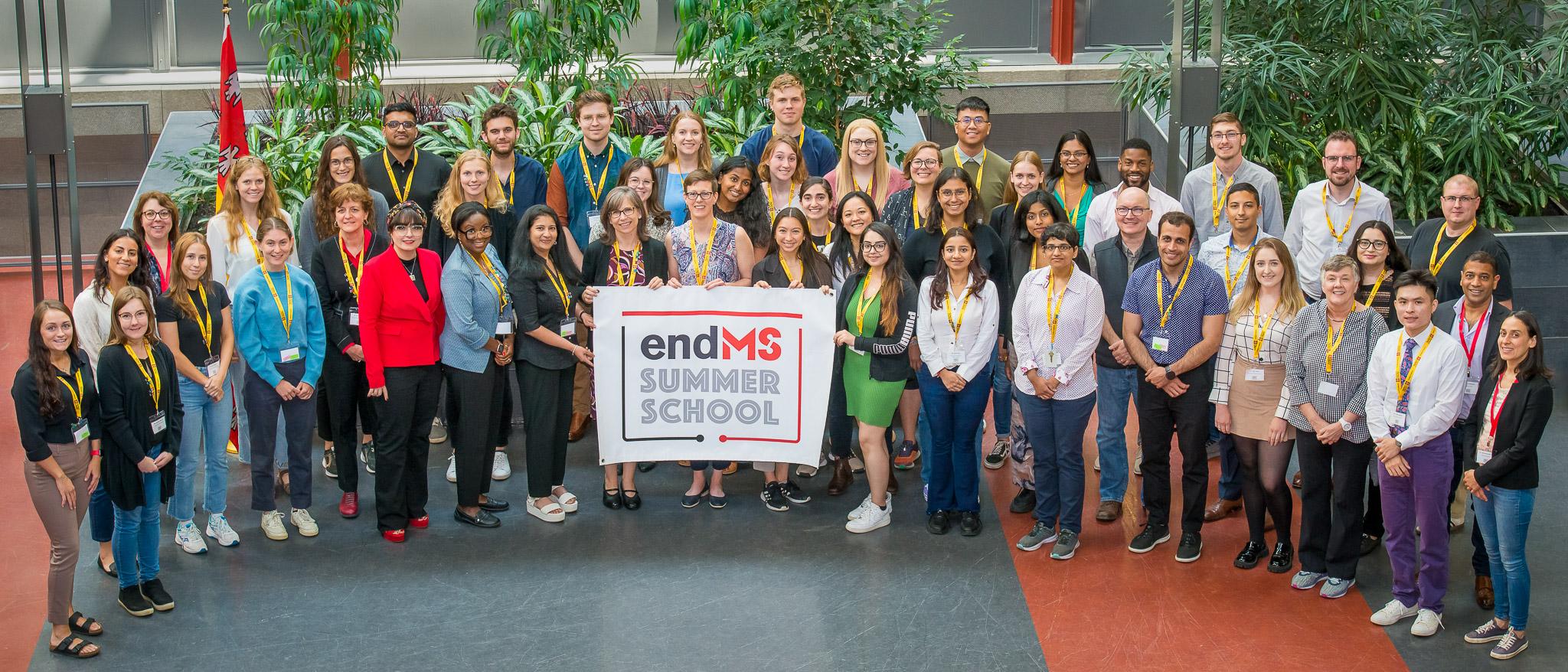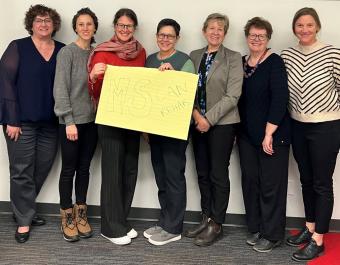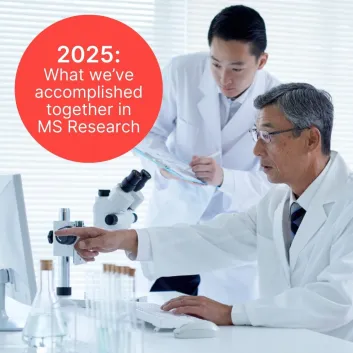- Research
- December 6, 2023
Accelerating Research for a World Free of Multiple Sclerosis
Here’s What We’ve Achieved in 2023
Looking back at this past year in research, we reflect on the exciting advances that are accelerating our understanding of multiple sclerosis (MS). Advances in research are only possible because of the generous support from our amazing MS community, including event participants, volunteers, fundraisers, donors, and research partners. The MS community is unique and powerful, reflecting the passion for discovery in MS, and we’re grateful for your support.
In research, we know partnerships are essential to maximize our impact because they provide us with opportunities to coordinate funding, expertise, and resources. We’ve learned a lot from being a founding and managing member of the International Progressive MS Alliance where we work with global partners to tackle challenges in progressive MS (read more on the Challenges in Progressive MS Awards – here).
This year, MS organizations from around the world, including MS Canada, made a commitment to work together to accelerate progress on global priority areas that will speed the development of MS cures highlighted in the Pathways to Cures roadmap (read more – here).
We’re proud to share some of the exciting research from this year, including investing in the next generation of MS researchers, and new research and findings within the following MS research priority areas: understand and halt MS disease progression, advance treatment and care, and prevent MS.
Supporting the Next Generation of MS Researchers
We’re committed to training the next generation of MS researchers. This year, we announced 46 endMS Personnel awards to support 15 postdoctoral fellowships and 31 doctoral studentships. These trainees represent a critical talent pool of up-and-coming MS researchers. We highlight other investments in training below.
-
We partnered with the Stem Cell Network to support a Postdoctoral Fellowship in Regenerative Medicine for MS that aims to attract the most promising young scientists at the intersection of stem cells, regenerative medicine, and MS.

Dr. Elisabet Jakova (University of Manitoba) was awarded the inaugural Stem Cell Network – MS Canada Postdoctoral Fellowship for her research entitled “Therapeutic Potential of Neuregulin-1 in Promoting Neural Stem Cell Mediated Repair in Progressive MS.” Her research aims to look at the potential of neuregulin-1 as a treatment to prevent MS disease progression and support repair (read more – here).
- The endMS National Training Program, led by Dr. Christina Wolfson (McGill University) which we funded, supports trainees by enhancing their knowledge and skills in MS through educational and networking activities, including the endMS Summer School. This year, the endMS Summer School titled “Translating Basic MS Research into Clinical Practice”, was hosted by Dr. Manu Rangachari and Dr. Luc Vallière at Laval University, Quebec City from June 19-22. A total of 40 graduate students, postdoctoral, and clinical fellows from across Canada attended this year’s endMS Summer School.

“Engaging and networking with researchers working on the same topic from very different perspectives, and hearing from experts in the area gave me a better perspective on how to better approach my own work.”
– endMS Summer School attendee
“Being able to communicate with individuals personally living with or affected by MS opened my eyes to the real world importance of the work I do.”
– endMS Summer School attendee
Understand and Halt Disease Progression
We need to better understand disease progression in MS to develop more effective treatments and improve care strategies for people living with MS. We’re making progress in understanding the genetics of progression, since the discovery of the first genetic factor that influences disease severity, and in supporting the development of innovative treatments.
-
Researchers Uncover First Genetic Factor Associated with Disease Severity in MS. In a large international study, researchers including MS Canada-funded researcher, Dr. Adil Harroud (McGill University), identified the first genetic risk factor linked with longer-term outcomes and progression in MS. They found this genetic factor increases risk of disability progression by almost 4 years as measured by shorter time to EDSS 6.0. Identifying new pathways involved in MS disability progression could help guide the development of future therapies for people living with MS. Read more about this study here.
-
A Potential MS Therapeutic that Enhances Repair and Regeneration. Research led by Dr. Anastassia Voronova (University of Alberta) found that an immune system factor called fractalkine promoted repair of myelin, the protective coating surrounding nerve fibers, in the brain of mice with MS-like disease. These discoveries will be important for the future development of MS therapies. Read more about this study here.
-
A Promising Non-Invasive Therapy to Promote Repair and Remyelination in MS. Research led by Dr. Valerie Verge (University of Saskatchewan) found that a non-drug-based treatment approach called acute intermittent hypoxia (AIH), which involves short periods of reduced oxygen, reduces inflammation, protects nerve fibres, and promotes repair of nerve fibres in mice with MS-like disease. While the findings of this study are promising, more research will need to see whether this treatment is safe and effective in people with MS. Read more about this study here.
Advancing Treatment and Care
From new therapies to rehabilitation, it’s important we focus on the development of new therapeutic options that improve the health and well-being of people living with MS.
-
Improving Cognition in People with Progressive MS. A large multicenter international clinical trial we funded looked at ways to improve cognition (or processing speed) in people with progressive MS. Dr. Anthony Feinstein (University of Toronto / Sunnybrook Health Sciences Centre) and team conducted a clinical trial to test whether the interventions, cognitive rehabilitation or aerobic exercise, or a combination of both, can lead to improvements in cognition in people with progressive MS. The results of the clinical trial showed that cognitive rehabilitation combined with aerobic exercise was not better than either intervention alone in improving cognition. Researchers did not find significant differences in the processing speed of participants between the four treatment groups, including the ‘sham’ treatments. The researchers did find that two-thirds of all participants of the study showed an improvement in information processing speed and almost half retained these improvements at 6 months. This study shows that cognition may be improved in people with progressive MS. Read more about this study here.
-

Canadian Researchers Are Accelerating MS Rehabilitation Research. To advance MS rehabilitation, a team of multi-disciplinary rehabilitation researchers and clinicians from across Canada have come together to form a collaborative network called MSCanRehab. By creating this network, MSCanRehab can more quickly and efficiently develop and test new approaches, therapies, and technologies to help restore function in people living with MS. Together, this team aims to lead large-scale, multi-site clinical trials to advance discovery and transform the field of MS rehabilitation (read more – here).
“By bringing Canadian rehabilitation scientists together, MSCanRehab is setting research priorities and conducting collaborative clinical rehabilitation trials to move the field forward at a faster pace.”
– Dr. Michelle Ploughman, Memorial University
- Does Exercise Improve Depressive Symptoms in Youth with MS? Depression, fatigue, and cognitive impairment are estimated to affect up to 75% of youth with MS. In partnership with the National MS Society (NMSS) in the US, we’re funding a clinical trial led by Dr. Ann Yeh (The Hospital for Sick Children) to determine whether exercise can improve health outcomes, including depression, in youth with MS. This research has the potential to identify effective strategies to address MS symptoms and improve health outcomes in youth with MS.
Prevent MS
Understanding MS risk factors will help support the development of early intervention and prevention strategies. We know Epstein-Barr virus (EBV) infection is a strong risk factor for MS. EBV is the virus that causes infectious mononucleosis (commonly called mono). Recently, EBV was shown to be a necessary and early trigger for MS disease onset. We are funding studies to further understand how EBV acts as a risk factor for MS and potential strategies to prevent infection or remove it. Read more about EBV here.
-
Understanding EBV in MS – from autoimmunity to treatment approaches. In partnership with NMSS, we’re funding two Canadian-based research studies aimed at better understanding the role of EBV in MS onset and progression. Dr. Marc Horwitz (University of British Columbia) and team will develop a unique mouse model that can be infected with human EBV. This animal model will allow researchers to better understand how EBV works to increase risk of MS, assess the role of EBV in different MS subtypes (i.e., relapsing-remitting MS and primary progressive MS), and examine potential treatment and preventative strategies. Dr. Horwitz will also test different therapeutic strategies (e.g., vaccine against EBV) to either prevent or remove existing infection in an animal model of MS.
-
When does MS begin after Epstein-Barr Virus Infection? Dr. Dalia Rotstein (St. Michael’s Hospital) and team are examining population health data to understand the timeline from getting infectious mononucleosis to MS onset. They will also look at the timeline from infectious mononucleosis to the starting point of the MS prodromal phase, a period of early non-specific symptoms before MS onset. Findings from this research will be important for developing diagnostic and therapeutic strategies to prevent MS. Read more about this study here.
We greatly appreciate the commitment of MS researchers who are advancing our knowledge and understanding of MS and training of the next generation of researchers. Together, we will continue to work towards a world free of MS.
To stay updated on MS research, read the latest in research news and subscribe to our quarterly Research in Action newsletter.
- Log in to post comments

